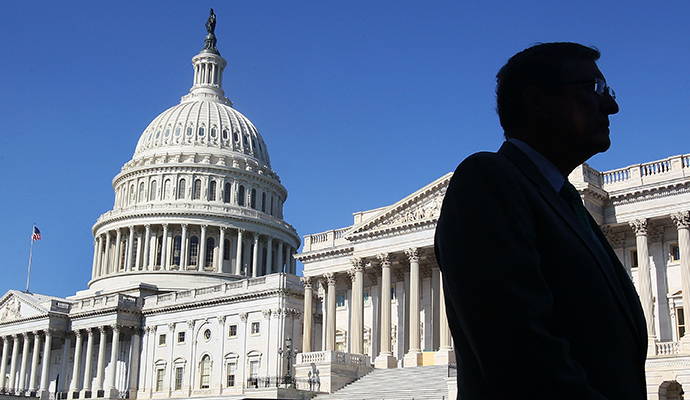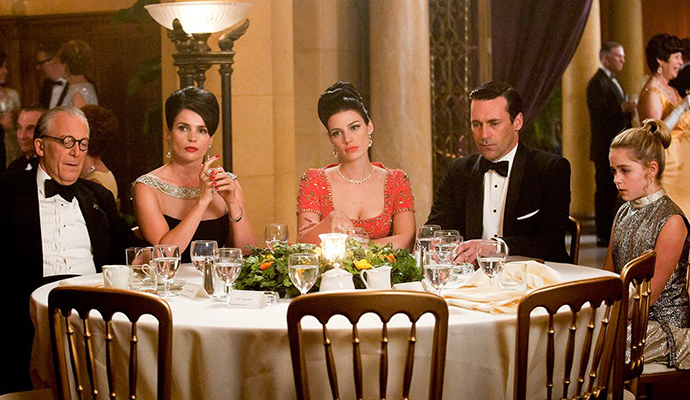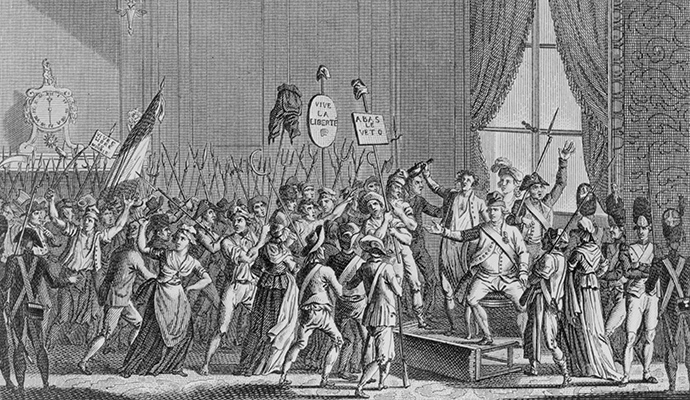The Germans have a perfect word for American disillusionment
Weltschmerz

A free daily email with the biggest news stories of the day – and the best features from TheWeek.com
You are now subscribed
Your newsletter sign-up was successful

Disillusioned? Has your initial idealism been ground into cynicism? Dismayed by discovering how things really work?
There's a term for what you're suffering: Weltschmerz.
Literally "world pain" in German, "Weltschmerz" describes the pain idealists feel upon realizing that the world does not live up to their expectations of what it should be. It's a word only the Germans could come up with — but an affliction that's hitting America hard.
The Week
Escape your echo chamber. Get the facts behind the news, plus analysis from multiple perspectives.

Sign up for The Week's Free Newsletters
From our morning news briefing to a weekly Good News Newsletter, get the best of The Week delivered directly to your inbox.
From our morning news briefing to a weekly Good News Newsletter, get the best of The Week delivered directly to your inbox.
An entire genre of essays has emerged to chronicle American Weltschmerz. The structure of these pieces typically follows a similar pattern: A hero enters industry X, only to see their hopes dashed against its disappointing realities — before then using their revelation to rally against the prevailing system.
Weltschmerz, though, is not an obscure German phrase for what some may label as "whining." It has a history of both driving progressive reform and fomenting revolution. How America adapts to this latest upsurge of Weltschmerz will say much about its prospects for adapting its myriad failing institutions to the realities of a changing age.
Nearly every elite American industry has had a recent prominent Weltschmerz — or more.
Washington Weltschmerz is by now a common trope. Depictions of government have moved from West Wing to Weltschmerz. This Town was Weltschmerz played as dark comedy. Veep is Weltschmerz as slapstick. House of Cards is Weltschmerz as tragedy — and farce.
A free daily email with the biggest news stories of the day – and the best features from TheWeek.com
But the critique has extended to those who have served inside the system. The Obama Administration has proven particularly susceptible. When I explained Weltschmerz recently to two former mid-level appointees, one replied, "Weltschmerz was the story of the first term." The other added, "the second term has just been Schmerz" – just pain.
A series of high-level appointees — Robert Gates, Leon Panetta, Steven Chu — have echoed Vali Nasr's description of working in the Administration as "deeply disillusioning" (even accounting for whatever personal or policy differences they have or books they have to sell.)
Anne Marie Slaughter's "Why women still can't have it all" — while about a much broader issue in gender equality — was, likewise, rooted in the experience of a Washington that does not live up to expectations.

And it's not just the Obama appointees. Mike Lofgren, a former Republican Hill staffer, penned a takedown of his party with a title that's an homage to Robert Graves' Good-Bye to All That. Former speechwriter Matthew Latimer shared his disillusionment with the Bush White House. Jason Harrington showed Weltschmerz at the TSA.
Wall Street has similarly had a series of Weltschmerz pieces: Sam Polk described "Money Addiction" in these terms: "I felt as if I'd been punched in the gut." In his Goldman Sachs takedown, Greg Smith contrasted his initial idealism to being unable to "look students in the eye and tell them what a great place this was to work."
We've seen it in journalism: Sam Youngman told Washington to "Take This Town and Shove it" after falling "out of love with journalism." Charles Lewis credited his departure from 60 Minutes to "the absurdity of this faux-investigative game." Michael Hastings has had his novel about being disillusioned as an intern at Newsweek published posthumously.
We've seen it in law and medicine — the two traditional models of career stability. Gretchen Rubin started her happiness project after she discovered that — wait for it — lawyers aren't happy. According to David Bornstein, "medicine is facing a crisis, but it's not just about money; it's about meaning."
There's been Weltschmerz in sports. Former NFL player John Moffitt wrote that the "money was not worth" playing in a league that is "merchandizing human beings" — this was before the Ray Rice and Adrian Peterson scandals.
Lauren Weisberger gave us Weltschmerz in fashion in The Devil Wears Prada. Piper Kerman gave us Weltschmerz for prisons in Orange is the New Black.
Weltschmerz can now be described as the way we think of whole swaths of society: Work is bullshit. College is a sham. Silicon Valley is delusional.
Of course, Weltschmerz is a long-standing concept. Coined by the German Romantics, its first usage is credited to novelist Johann Paul Friedrich Richter. It was the quintessential coming-of-age syndrome. Symptoms included shock, followed by depression, and the eventual choice between acceptance, rebellion, or escapism — even suicide. Think The Sorrows of Young Werther. Later Romantics refined Goethe's Bildungsroman genre. These coming-of-age stories marked the cultural landscape of 19th century Europe, as entire societies grew up amidst the angst of a changing epoch.
Weltschmerz has also been a part of coming-of-age in America. The term was first used in American literature by John Steinbeck in The Winter of Our Discontent and East of Eden in an anglicized form as "welsh rats." The assorted disillusioned cabinet secretaries, journalists, and Wall Street types cited have all had their predecessors: from Robert Reich's Locked in the Cabinet to Sinclair Lewis' Babbitt.
A 1991 New Yorker comic even joked about whether Weltschmerz was like the flu. (Weltschmerz is just the type of thing to strike New Yorker readers).
But what explains the current pandemic? The usual suspects — generational change and declining trust in a broad swath of institutions — are by now well known.
These factors have been key to the spread of contemporary Weltschmerz. Mad Men has become so popular today because the generational change it depicts in the 1960s is mirrored in the rise of the Millennials.

Millennials have been hit hard in the midst of a dropping global barometer of trust. They are increasingly skeptical of government, in particular.
And for good reason. They've come of age against the backdrop of a series of national setbacks: the failure to prevent 9/11; the never-ending conflicts in Iraq and Afghanistan; the Financial Crisis and its continued drain on the economy; and the disillusionment of Obama's promise of "Hope and Change."
But American Weltschmerz has extended far beyond Millennials. It has become the dominant zeitgeist.
The country is currently experiencing social, economic, and technological "disruption" similar to what sparked the 19th century Romantic backlash — and its later incarnations.
The Romantic era emerged out of disillusionment of the initial wave of the Industrial Revolution.
The fien de siècle similarly emerged out of the second wave of the Industrial Revolution — from the spread of the railroads to the emergence of mass consumer societies.
Both backlashes were defined not only by disillusionment, but by the belief that intellectuals — in both culture and politics — should be the vanguard of change.
Weltschmerz is distinct from similar terms like ennui; it implies not only malaise but also the belief that the world could be better — hence the pain at its shortcomings.
This would be an obscure point if not for this historical reality: intellectuals need an overarching project — lest they succumb to ennui. The Weltschmerz genre is an effort to transform the system — even if personal failings are sometimes also subsumed into a critique of the larger system.
To put it differently, the personal eventually becomes political.
Historically, political projects driven by Weltshmerz have come in two broad categories: reform or revolution.
Following the initial wave of industrialization, both England and America favored gradual reform to expand enfranchisement — at least until in the American context it reached its limit in slavery, precipitating the Civil War.
Continental Europe, in contrast, was gripped by a series of revolutions and counter-revolutions: the French Revolution and 1848 as well as new systems of authoritarianism and radical nationalism.

A similar trend occurred during the second wave of industrialization. The Belle Époque was also marked by disillusionment with Gilded Age inequality, Victorian conformism, and (far too infrequently) the brutality of colonialism.
Weltschmerz again helped spark political movements. On the reformist side, these included: The progressive movement in America, the early development of social insurance in England, France, and Germany, and the reformist modernization program of Prime Minister Pyotr Stolypin in Russia.
At the same time, an eruption of revolutionary and reactionary movements — anarchists, nihilists, extreme nationalists — soon enough brought Europe to the cataclysm of the First World War. Its eventual outputs, the Russian Revolution and the Fascist and Nazi counter-Revolutions, further refined industrialized slaughter.
The rebuilding of the international order in the post-War era — and its expansion after the end of the Cold War — has produced new levels of peace, prosperity, and technological advancement.
We are reportedly now entering a "Second Machine Age" — a "New Digital Era" — that promises unheralded developments in everything from data to robotics to human rights.
Yet, the same old concerns keep creeping in: rising inequality, political instability, a spiritual vacuum, unmet expectations.
The Facebook effect of comparing yourself to your friends' "happiness" has now gone global. So has the ability to organize — for reform or revolt — when the ideal does not meet the reality.
The success of reform — still very much in doubt — depends on whether we heed the messages that these Weltschmerz authors are delivering. If not, the convulsions of recent years could intensify even further.
Psychic toll may still take its toll on society.
Editor's Note: A previous version of this article misidentified a former cabinet official. It has since been corrected. We regret the error.
Sign up to get The Weekly Wonk, New America's digital magazine, delivered to your inbox each Thursday here.
More from The Weekly Wonk...
-
 Health insurance: Premiums soar as ACA subsidies end
Health insurance: Premiums soar as ACA subsidies endFeature 1.4 million people have dropped coverage
-
 Anthropic: AI triggers the ‘SaaSpocalypse’
Anthropic: AI triggers the ‘SaaSpocalypse’Feature A grim reaper for software services?
-
 NIH director Bhattacharya tapped as acting CDC head
NIH director Bhattacharya tapped as acting CDC headSpeed Read Jay Bhattacharya, a critic of the CDC’s Covid-19 response, will now lead the Centers for Disease Control and Prevention